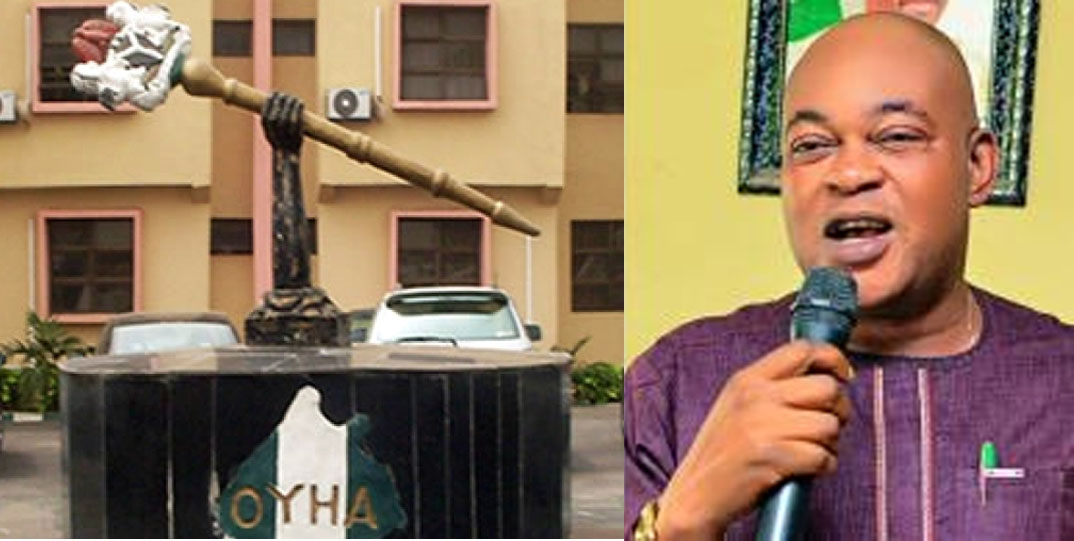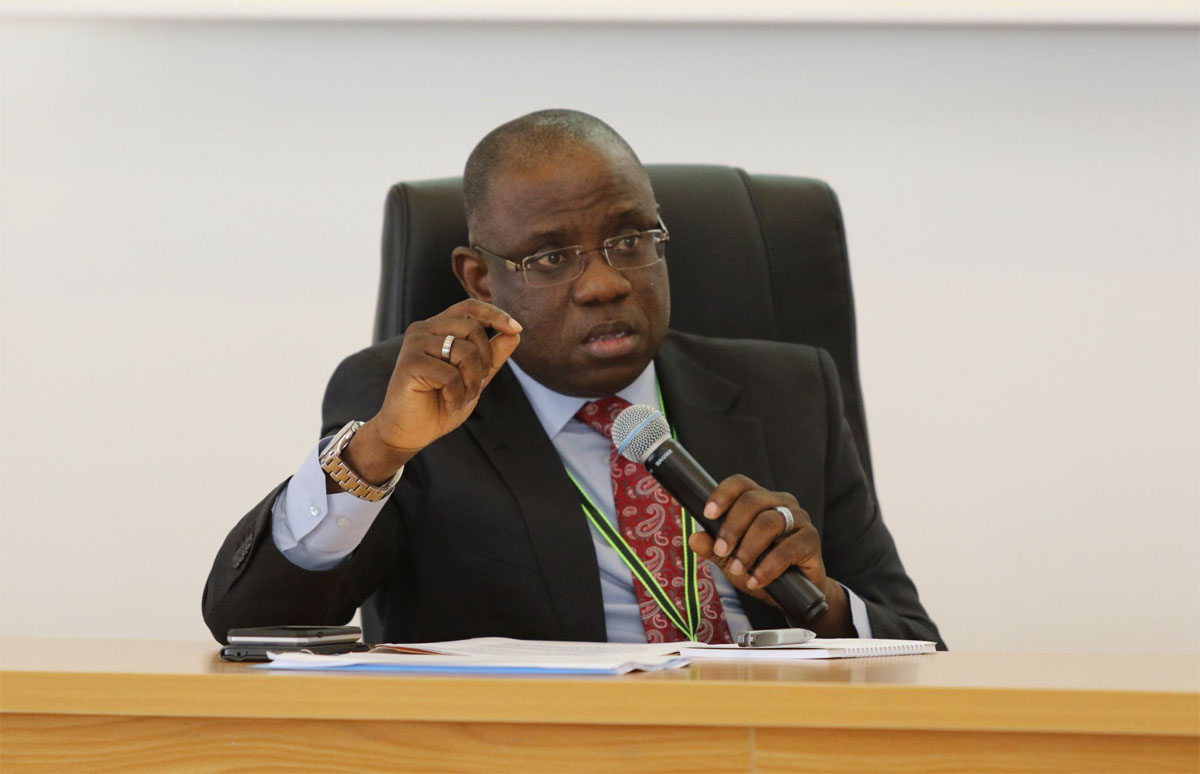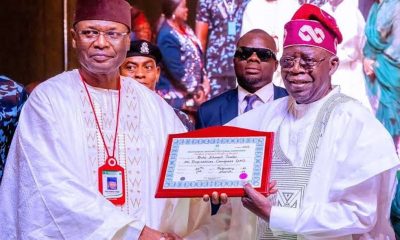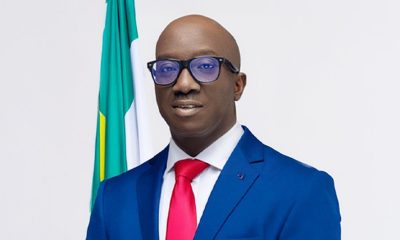Opinion
(Opinion) Oyo Assembly trespasses over illegal suspension of Oyo East LG Chairman

(Opinion) Oyo Assembly trespasses over illegal suspension of Oyo East LG Chairman
Like executive, like legislature in Oyo State, rascality is now the order of the day as Oyo State is now synonymous with illegality and power exuberance. The only Governor which condemned Supreme Court landmark judgment on local government autonomy is the Oyo State fanatical emperor; Governor Seyi Makinde as the Oyo State House of Assembly was reported on Thursday October 31, 2024 to have also suspended the Chairman of Oyo East Local Government, Olusola Oluokun, over a viral video that was purportedly obnoxious and unbecoming of a Chairman of a local government. While the Governor deliberately attacked the Supreme Court judgment to discredit the then Chief Justice of Nigeria who hailed from Oyo State, did the Assembly also want to discredit Alaafin of Oyo Empire symbolizing Yorubaland which Oyo represents?
To be sincere, apart from Ladoja/Akala regime which witnessed thugs’ incursion into Oyo politics, the current administration is the most ruthless that even elevated hooliganism in the State and made thugs of undisciplined people disciplinary committee Chairman of Transport Arms of the terror network. An absurdity of highest order to the Pace Setter State!!!
Actually, the atmosphere in Oyo State House of Assembly since 2019 has shown that the house is either full of political puppets or novice in legislative duties, No wonder, the house members do not even know their limit in law making nor know the laws they are supposed to superintend. There was a day I even asked my own Assembly member from Orelope State Constituency copy of a Law passed when he joined the House but I was surprised that he said he did not have a copy of the bill apart from political brag by telling me he did not know the person he was responding to despite introducing myself formally as usual before making my request. As activist, I did not know more than 65% of people I have attended to their cases. They only got my contact and when they explained their situations, I proffer the solutions where there was no need of seeing me. And once they got result, that is the end. If an honourable has no copy of the law he was part of the makers, do we need to ask them what oversight functions they perform when they do not even know what to do?
READ ALSO:
- You can be charged to court once you’re over 7 years old – Police
- Woman allegedly stabs husband to death in Oyo
- NAFDAC recalls Nivea Deodorant over harmful chemical content
If the House of Assembly is constitutionally informed and literarily exposed, it would have known it is not only illegal for house of Assembly to suspend or sack a local Government Chairman the Same way the National Assembly cannot suspend a Governor or impeach him but that it smears ill of the constituents of that Assembly. The legislative functions of the councilors at the local government include screening and approval of local government budget, nominees of local government chairman such as Supervisors, special assistants and advisers, suspension or removal of local government chairman among others and to conduct oversight functions on the entire local government departments and Units where allocation of resources was made during the financial year. Ohhhh, let me ask Oyo Assembly o, is it the National Assembly that helps you perform your roles? If not, why hijacking the local government administration just because they were selected by you boss?
So, if at all, there is any kangaroo law at the State level which empowers the State Assembly to suspend or sack a local government, that law exposed the mediocrity of those who made it and or implement it as not being sound intelligently in the task of legislative functions. This is because if the National Assembly doesn’t have power to suspend a Governor, the State House of Assembly should know it trespasses and subverts local government administration independence which the Supreme Court has affirmed. Is Oyo Assembly now reversing Supreme Court judgment as a result of power abuse or display of sheer ignorance of the laws?
According to 1999 Constitution of the FRN (as amended), it provides in Section 4 (5) “If any Law enacted by the House of Assembly of a State is inconsistent with any law validly made by the National Assembly, the law made by the National Assembly shall prevail, and that other Law shall to the extent of the inconsistency be void” and section (7) provides “The House of Assembly of a State shall have power to make laws for the peace, order and good government of the State or any part thereof with respect to the following matters, that is to say- (a) any matter not included in the Exclusive Legislative List set out in Part I of the Second Schedule to this Constitution; (b) any matter included in the Concurrent Legislative List set out in the first column of Part II of the Second Schedule to this Constitution to the extent prescribed in the second column opposite thereto” In all of these provisions, the State House of Assembly only has power on revenue allocated to a local government or budget made in respect thereof of any thing having to do with education among similar objects. At no point was any administrative power over local government administration vested in the State House of Assembly. Therefore, the suspension of the Oyo East local government by the Oyo State House of Assembly is ultra vires by the application of Doctrine of covering the veil. Without requiring litigation, the House should reverse itself as quick as possible except it wants to make mockery of itself and the occupants of that House
Luqman Soliu
Abeokuta, Ogun State
(Opinion) Oyo Assembly trespasses over illegal suspension of Oyo East LG Chairman
Opinion
Farooq Kperogi: In 2027, Tinubu won’t win; the opposition will lose

Farooq Kperogi: In 2027, Tinubu won’t win; the opposition will lose
If economic health, social vitality, and the raw pulse of public opinion were the only indicators relied upon to prognosticate the chances of President Bola Ahmed Tinubu’s reelection in 2027, I would say with cocksure certitude that he is condemned to be a one-term president.
Not even the most hopelessly unthinking defenders of the Tinubu presidency can deny that his reign so far has been defined by unrelieved economic hardship, staggering inflation, a collapsing naira, and a deepening sense of despair among Nigerians. In other words, the objective conditions for his political repudiation are overripe.
Nonetheless, elections, especially in Nigeria, are not won on the basis of public frustration alone. They are won — or lost — on the strength of political organization, elite consensus, strategic emotional manipulation, and the ability to convert popular anger into electoral mathematics. Call those the subjective conditions of electoral triumph, if you like. And this is where the tragedy of the opposition begins.
The opposition is undisciplined, hopelessly spineless, irredeemably fragmented, strategically bankrupt, and is falling cheaply into the trap set for it by Tinubu.
First, the opposition is shaping up to be disappointingly provincial. It is dominated by elements from a slice of the North that seems to be suffering from withdrawal symptoms from loss of political power. This is reminiscent of the narrow-minded opposition to former President Olusegun Obasanjo’s second term, which helped him to create a coalition of southern Nigerian, Christian northerners, along with portions of the North that felt excluded from the regional mainstream.
Perhaps the most egregious expression of naïve, historically inaccurate, self-sabotaging provincial self-importance from the region came five days ago from Dr. Hakeem Baba-Ahmed, a former appointee of the Tinubu administration who, before his sojourn in the administration, was a higher-up at the Northern Elders’ Forum.
READ ALSO:
- Zulum meets with Cameroonian troops after deadly Boko Haram attack in Wulgo
- Tribunal upholds Nigerian government $220m fine against Facebook, WhatsApp
- Troops capture wanted bandit, recover cache of ammunition
“In the next six months, the North will decide where it stands,” Dr. Baba-Ahmed said in a viral post. “If the rest of the country wants to join us, fine. If not, we will go our own way. One thing is clear: nobody can become president of Nigeria without northern support.”
Well, Olusegun Obasanjo was elected for a second term in 2003 without “northern” support. I inserted scare quotes around “northern” because, although Baba-Hakeem appeared to be ecumenical in his conception of the North (he referenced “Muslims, Christians, Fulani, Baju, Mangu” — the Baju and Mangu being ethnic groups from southern Kaduna and Plateau — indicating pan-Northernism), we all know that the North has never been a monolith and is often riven by religion.
When people like Baba-Ahmed talk of the “North” in such tyrannizing, self-aggrandizing terms, they often mean a particular part of the North.
Obasanjo deployed the perks of incumbency to mobilize the entire South, appeal to the Christian North, and to make offers to parts of the Muslim North that Muhammadu Buhari didn’t consider “northern” enough to deserve his electoral entreaties. Even if the election wasn’t rigged, Buhari didn’t stand a ghost of a chance of winning the 2003 election.
Former President Goodluck Jonathan used Obasanjo’s 2003 template in 2011 to defeat Muhammadu Buhari. But in 2015, Jonathan lost the Southwest to Buhari, which led to Jonathan’s loss and Buhari’s epochal, unexampled triumph.
This shows that no region can win a national election without the other, making Baba-Hakeem’s self-lionizing boast a rhetorical gift to Bola Tinubu. We’re already seeing its effect.
Several southerners who are wriggling in the torment of Tinubu’s economic policies have chosen to rather live with the sting of his policies than embrace the provincial arrogance of people like Baba-Ahmed who arrogate to themselves the exclusive power to determine who is president and who isn’t.
Similarly, in Nigeria’s informal power-sharing arrangement, the expectation is that after eight years of a northern presidency that ended in 2023, no northerner should be president again for the next eight years. But the northern opposition to Tinubu seems to be anchored on a desire for premature power grab back to the North.
READ ALSO:
- Police arrest two Kano men with N150m tramadol
- 2027: Ex-IGP Adamu eyes Nasarawa governorship
- Court urged to halt further release of LG allocations to Rivers State
Unless the northern politicians who have stuck out their necks to oppose Tinubu support another southerner with widespread appeal, their opposition will only strengthen Tinubu’s southern coalition and buy him sympathy from parts of the north that don’t enjoy regional political hegemony.
This is particularly so because since the start of the Fourth Republic, the South has never expressed opposition to northern presidencies by sponsoring southern candidates. The South supported Atiku Abubakar, a northerner, in 2019. Umar Musa Yar’adua’s main opponent in 2007 wasn’t a southerner. It was Muhammadu Buhari, a northerner.
But when it was the South’s turn to get presidential power in 2023, the North presented a formidable candidate in the PDP. In fact, the APC hierarchy, with the support of Muhammadu Buhari, settled on former Senate President Ahmad Lawan as the “consensus candidate.” That was embarrassing.
Already, there are insinuations that PDP governors who are defecting to APC are doing so not just because they are being bludgeoned into it through subtle EFCC prosecutorial threats but also because they fear that their party’s standard-bearer in 2027 will be a northerner.
I understand the dilemma of the northern politicians in opposition. Should they support a southern candidate to dislodge Tinubu, such a candidate would, as sure as tomorrow’s date, seek a second term. That would defer the presidential aspirations of the northern politicians by eight years instead of four.
If they sit by listlessly as Tinubu shoves them to the margins of the orbit of power, they will be like fish flailing out of water. They will be so disoriented and weakened that by the time presidential power drifts back to the North, they probably won’t even have the strength to fight for a place.
Northern opposition politicians like Nasir El-Rufai also don’t seem to realize that the Social Democratic Party (SDP) they have embraced as the vehicle to displace Tinubu is, in fact, Tinubu’s spare car.
It is fully fueled, tuned, and parked in his garage for contingencies. As early as April 2022, BusinessDay reported that Tinubu had opened backchannel talks with the SDP and explored it as a fallback platform in case his APC ambitions stalled.
In other words, the opposition is not commandeering an independent vehicle; they are clambering into a car whose engine hums to Tinubu’s touch and whose keys he can reclaim at will. They are, quite literally, riding shotgun in a machine built for their defeat. Unfortunately, he has also hijacked their car, the PDP!
Adewole Adebayo, SDP’s 2023 presidential candidate, unintentionally echoed this sentiment a few days ago when he used the metaphor of a car to send a not-so-subtle dig at El-Rufai.
“As for the coalition, we’re listening to them,” Adebayo said. “What we don’t want to be—we don’t want to be a get-away car for a conspiracy and robbery we did not plan. So, if you planned something somewhere and you want to use the SDP as a get-away car, that’s not available.”
Adebayo added another pointed dart to El-Rufai when he said, “if the coalition is a crying center for disappointed Tinubu followers, they should go back to Tinubu who gave the promise to them and resolve their differences there.”
In the end, Bola Ahmed Tinubu’s greatest electoral asset may not be the loyalty of the masses, the success of his policies, or even the cunning of his political machinery. It may well be the disarray, hubris, provincialism, and strategic myopia of his opposition.
They are too divided to form a coalition, too impatient to build trust across regions, and too blinded by immediate resentments to think in terms of long-term electoral triumph.
In 2027, Tinubu may stagger into a second term not because he inspires, but because he survives; not because he triumphs, but because those who should have dethroned him will, through a toxic mix of arrogance and amateurism, hand him victory on a silver platter.
It won’t be Tinubu who wins; it will be the opposition that loses. And Nigeria, trapped in the wreckage of broken possibilities, will pay the price.
Farooq Kperogi: In 2027, Tinubu won’t win; the opposition will lose
Farooq Kperogi is a renowned Nigerian columnist and United States-based Professor of Journalism.
Opinion
Islamic Forum: Essentially, who is the successful person on earth? By Afis A. Oladosu

Islamic Forum: Essentially, who is the successful person on earth? By Afis A. Oladosu
It was only a couple of days ago. I was busy as usual, and as expected of any believer, reading and rereading the Qur’an to discover, not how knowledgeable I was of and about its inner contents and latent meanings, but how ignorant I remain of its wonderful world. Yes. I am always happy to plead my ignorance of the emeralds and treasures that nest in each word and each ayat (sign) in the Last Testament (The Qur’an).
I know that no single exegesis and not one exegete has succeeded in explaining what, for example, the letter ‘Wa’ or the letter ‘Sin’ in the Qur’an means and could mean. Whenever you come to Chapter 36 of this wonderful scripture and you read Yasin, the only choice it offers you is to bask and bounce in the unknowability of its real import and signification.
In other words, despite their best efforts, the Qur’anic exegesis of al-Asyuti, Ibn Kathir, Fakhr al-Din al-Razi, al-Zamakhashari, and others are incurably far behind the inexhaustible data about and of this world furnished by the Qur’an, especially in relation to the continuities and changes in the contemporary period. Whereas the letters and the semiotics of the Qur’an remain unchanged and unchangeable, we are therefore fated, and perpetually too, to seek new meanings from our realities while being guided by divine ministrations.
Thus, it came to pass that I found myself in Surat Hud, ayat 108 where the Almighty says: “And as for those who are successful, they shall abide in paradise as long as the heavens and the earth endure; unless Your Lord may will otherwise…”. As soon as I read this ayat, my mind became flooded with a series of questions: essentially who are the successful ones? How can I be one of them? How do we determine success here on earth and what parameters has the Qur’an laid down with which extraterrestrial success would be determined?
The above question became urgent for me when I remembered those things usually considered as indices for earthly success in our world today. To be successful, today, as it was many years ago, is to have huge material comforts; and to have large families – children: boys and girls. To be successful is to have huge bank balances; to be an owner of big estates; to be the consort of beautiful women in the city.
READ ALSO:
- FG announces 2025/2026 overseas scholarship for graduates (See how to apply)
- Man beats brother’s wife to death in Jigawa
- Niger Gov Bago makes U-turn on dreadlocks ban after backlash
Yes. Earthly success is also often determined by status – being the CEO, the manager, the CMD. They are deemed successful those we refer to today as your excellencies, the (dis)honourables, your majesties etc.
Earthly success is also associational in nature. Whereas a man may have less than his friends, he may, however, consider himself successful having friends with big ‘fat pockets’, heads of corporate organisations and leaders in public governance. Our sense of self-worth is often a function of what they are worth; who is she, who is he, who are they! We glorify ourselves in the illusion of our ‘’closeness’’ to people in whose reality we are worth nothing!!!
Taken together as a problem, it is axiomatic that earthly successes, especially those defined by humans using others as parameters, are soapy, greasy and slippery. They are contingent, not immanent; just like sexual gratification, they depend on their realisation, the presence or intervention of the other who could be a compassionate benefactor or a querulous iniquitor.
Earthly successes are also transient. They are fated to the incertitudes and vicissitudes of time. What you consider a factor of success today could be a factor for failure tomorrow. Status and stations of life that often give false notions of terrestrial successes are usually ephemeral and transient.
Then I remembered my village. I remembered our fathers and their fathers, who considered themselves successful each time they contemplated how large their families were. I realised that they were no longer there in our homestead. The last time I went there, the question that crept into my mind was – “where are we?”
Many decades ago, we were over 30 children living together, and happily too, in that compound. But today, we are no more there! Our big compound has become a mansion for lizards; they have become boulevards for ants and termites! We have left our past behind us. Or rather, the past has left us for the future! Or rather, the Owner of the past and the present has caused that familiar and inimitable change such that what constituted success in the past no longer finds any bearing and meaning in the present
Where then lies permanent success? It lies, unequivocally, in holding firmly to the fundamentals of our faith in line with Quran 23: 1-10. It lies in being Muslim when being the other is the easiest option available to you! Eternal success is guaranteed only to those who come to their Lord on the day of resurrection and their hearts are pure and free of iniquities (Qur’an 26: 89).
Islamic Forum: Essentially, who is the successful person on earth? By Afis A. Oladosu
Opinion
NNPCL: Ojulari’s ambitious five-year $60bn investment agenda

NNPCL: Ojulari’s ambitious five-year $60bn investment agenda
On Thursday, the Nigerian National Petroleum Company Limited (NNPCL) unveiled an ambitious five-year growth and development agenda that will see it attracting $30 billion investments by 2027 and $60 billion by 2030. Group Chief Executive Officer (GCEO), Bayo Ojulari, who assumed leadership of the NNPCL just two weeks ago on April 4, disclosed this and more to members of staff during a town hall meeting held at the NNPC Towers in Abuja. What happened that day can be described in other words as the unveiling of the agenda of the new sheriff at the NNPCL and the direction which he wants the national oil company to go in terms of focus, vision and developmental plans under his watch.
If the 48 year old national oil company, founded on April 1, 1977 has been crawling all these years, it has now announced its readiness not just to start walking but get into running mode, preparatory to flying.
In a detailed press statement signed by the Chief Corporate Communications Officer, Olufemi Soneye and made available to newsmen, Ojulari, the new set man at NNPCL was as clear and emphatic as he could possibly be when he declared that the NNPC Ltd under his stewardship aims to attract sectorial investments worth $30 billion by 2027 which it will ultimately scale up to $60 billion by 2030; raise crude oil production to over two million barrels per day which it hopes to sustain through 2027 and attain three million by 2030; expand refining output to 200kbpd by 2027, and 500kbpd by 2030; grow gas production to 10bcf per day by 2027, and 12bcf by 2030 and deepen energy access and affordability for all Nigerians. This is certainly sweet music to the ears.
o avoid sounding as if he would simply wave some magic wands to achieve these lofty targets, Ojulari spelt out what must be done to arrive at the Promised Land. According to him, the company will be focusing on reconfiguring its business structure for agility and value creation; conducting independent value assessments to inform data-driven decisions; enforcing a robust performance management framework; building transparent, value-aligned partnerships with all stakeholders and most critically, taking control of its narrative.
The GCEO was meticulous in explaining the imperativeness of pursuing the company’s bold and ambitious agenda. Ojulari declared that the targets are not just metrics, but indicators of hope, jobs, industrial growth, and energy security for millions of Nigerians.
Describing NNPC Ltd as a renewed, forward-facing, and future-ready organisation that is proudly leading Nigeria’s energy transformation, Ojulari declared that “it’s time we tell our story—one of innovation, reform, and national pride.”
In what sounds like a new dawn at the NNPCL, Ojulari challenged the staff to be proud of NNPC Ltd’s recent transformation, stressing that the next journey to becoming a fully-fledged limited liability company will require a collective drive towards making NNPC more transparent, profitable and accountable.
READ ALSO:
- Osimhen to rake in N136bn from Man United
- U20 AFCON: Flying Eagles tackle Young Pharaohs in friendly
- Our states under bandits siege, forests taken over – Benue, Plateau govs
Ojulari then made a solemn pledge to give all employees the space to thrive and be able to outperform competitors in the oil industry, at least in Nigeria. “We will provide the best combination where the experienced and the young will both thrive towards achieving our set targets,” he assured.
He also did not overlook the work environment as he promised that his management will deepen collaboration with the company’s in-house and national unions to build a stronger, trust-based relationship that reflects shared purpose and mutual respect. He also called on all staff to lead with integrity, act with urgency, while bringing their very best to the table.
“We recognize that our greatest asset is our people. Our success will be powered by empowered employees. As such, we are fully committed to creating a workplace where everyone is valued, motivated, and inspired to thrive. Together, we will build a high-performing, globally competitive NNPC Ltd that is proudly Nigerian and proudly world-class,” Ojulari stated.
He vowed to pursue the company’s bold ambition and build an NNPC that will be the pride of all Nigerians.
“We stand at the gateway of a new era—one that demands courage, professionalism, and a relentless drive for excellence. The task before us is great, yet the opportunity to redefine Nigeria’s energy future is even greater. Now is the time to turn our transformation promise into performance,” Ojulari submitted.
Considering the pre-eminent position the NNPCL occupies in driving of the Nigerian economy, it would not be out of place to say that the appointment of Ojulari as the new GCEO of the national oil coy happened at the right time and marks a pivotal moment for Nigeria’s oil and gas sector. With a bold plan to attract $60 billion in investments over the next five years, Ojulari’s leadership is poised to significantly impact the nation’s economy, particularly in the context of President Bola Tinubu’s ambitious vision of transforming Nigeria into a trillion dollar economy. Ojulari’s multifaceted agenda which includes increasing oil production to 3 million barrels per day (bpd), increasing NNPCL’s crude refining capacity, enhancing gas production, and fostering a culture of accountability and transparency within the organization are all steps that should yield the desired result if pursued with the same vigour and passion with which they were reeled out, and there is no doubt that he would want to leave his foot print in the sands of time at the NNPCL.
READ ALSO:
- (UPDATED) 5 dead, 13 injured in Gombe Easter Monday auto crash
- FG to close Ijora Bridge for repairs April 27
- Zamfara residents broke after paying N500m to bandits
Ojulari’s planned strategy of ramping up oil production is to ensure that the NNPCL is able to not only meet domestic energy needs but also position Nigeria as a key player in the global oil market. This increase in production is essential for generating the revenue required to fund national development projects and social programs. Furthermore, it will create jobs and stimulate economic activities across various sectors, from transportation to manufacturing, thereby contributing to the overall growth of the economy.
In addition by prioritizing gas production, he aims to leverage the country’s vast reserves to meet both domestic and international demand. This focus on gas not only aligns with global energy transition trends but also provides an opportunity for Nigeria to continue to upscale its diversification of her energy portfolio. Increased gas production can lead to the establishment of gas-based industries, which can further drive economic growth and create employment opportunities.
An important point to note in Ojulari’s leadership philosophy is the emphasis on accountability and transparency. By fostering a culture of openness within NNPCL, he aims to rebuild trust with stakeholders, including investors, government agencies, and the public. This commitment to transparency is crucial for attracting the $60 billion in investments needed to realize his ambitious plans. Investors are more likely to commit capital to an organization that demonstrates integrity and a clear commitment to ethical practices. Moreover, accountability within the organization can lead to improved operational efficiency, reducing waste and enhancing profitability.
Staff motivation and welfare are also central to Ojulari’s agenda. Recognizing that a motivated workforce is essential for achieving organizational goals, he has vowed to implement initiatives that prioritize employee well-being and professional development. By investing in training and creating a conducive work environment, Ojulari aims to empower NNPCL employees to perform at their best. This focus on human capital development will not only enhance productivity but also foster loyalty and reduce human capital quick turnover, ultimately benefiting the organization and the economy at large.
Another critical aspect of Ojulari’s agenda is the plan to foster collaboration and dialogue with labor representatives. This approach certainly will engender a more harmonious and peaceful working environment, reducing the likelihood of industrial disputes that could disrupt operations and hinder progress.
What Nigerians are about to witness in Ojulari’s leadership at NNPCL promises to be a comprehensive and forward-thinking approach to the challenges facing Nigeria’s oil and gas sector. His plans to attract significant investment, increase production, and foster a culture of accountability and employee welfare are certainly essential if as a major player in the nation’s economy, President Bola Tinubu’s vision for a trillion dollar economy within a decade is to be realised. If he can effectively execute this vision, Ojulari certainly will not only transform NNPCL but also contribute significantly to Nigeria’s economic growth and development.
NNPCL: Ojulari’s ambitious five-year $60bn investment agenda
-

 metro23 hours ago
metro23 hours agoTruck falls from Lagos bridge on two buses
-

 metro17 hours ago
metro17 hours agoHow Access Bank staff secretly filmed 400 colleagues naked in office
-

 Education2 days ago
Education2 days agoJAMB officials seize candidates’ hijab at Caleb varsity, Muslim students kick
-

 metro2 days ago
metro2 days agoOmokri : How Tinubu’s political mastery started with Abiola, says El-Rufai, Obi’s forces can’t stop him
-

 International2 days ago
International2 days agoUS releases 41 countries granted 90-day entry without visas (full list)
-

 metro2 days ago
metro2 days agoGroom cancels wedding, marries another lady same date, venue
-

 metro1 day ago
metro1 day agoEFCC declares four persons wanted over CBEX scam
-

 metro18 hours ago
metro18 hours agoDSS arrests British Army Officer, others, seizes 57 AK47











